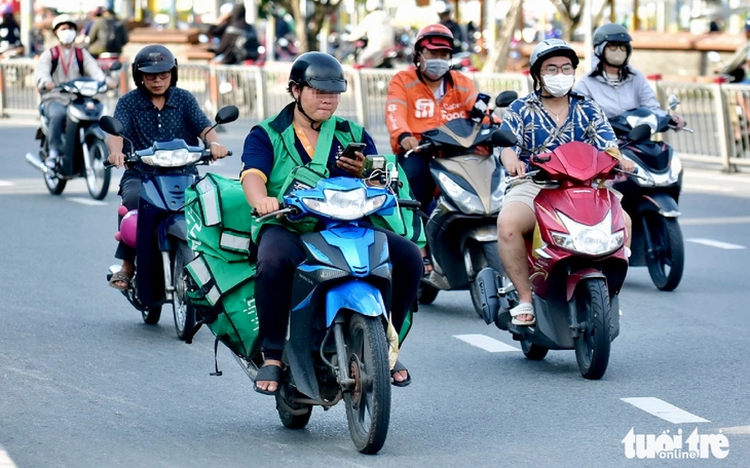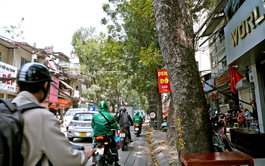
The Ho Chi Minh City Institute for Development Studies has proposed transitioning gasoline motorbikes used by delivery and ride-hailing drivers to electric vehicles. Photo: T.T.D. / Tuoi Tre
Units are required to submit their proposals to the department by July 15 for submission to the Ministry of Construction.
This move follows the prime minister’s directive for Hanoi to ban gasoline-powered motorbikes within Belt Road No. 1 starting July 1, 2026.
Most citizens support limiting gasoline and diesel vehicles to reduce emissions and protect the environment.
However, they also expect the city to carefully review and plan a phased approach, specifying where and who will be affected first.
Under the national green energy transition and emission reduction plan, the Ho Chi Minh City government has assigned the Department of Construction to take charge of a comprehensive emissions control plan.
The plan is divided into two phases:
Phase 1: Create a roadmap and policies to support the transition of public buses to electric or green energy vehicles, beginning in 2025, with the goal of reaching 100 percent of green-energy buses by 2030.
Phase 2: Propose the municipal People’s Council issue policies targeting emissions reductions from all other vehicle types. The focus will include incentives and support for individuals, households, cooperatives, and businesses transitioning to clean transport.
The plan also explores zoning solutions to prioritize green vehicles and restrict fossil-fueled ones in areas such as central Ho Chi Minh City, the former Can Gio area, and Con Dao Special Zone.
Le Thanh Hai, director of the Economic Application Consulting Center under the Ho Chi Minh City Institute for Development Studies, said that Ho Chi Minh City is taking cautious but effective steps toward controlling transport emissions.
He highlighted progress in the bus system, with around 31.1 percent of buses now using clean or green energy, such as electricity or compressed natural gas.
Numerous companies are proposing investments in infrastructure and electric bus fleets. Starting August 1, the city will launch 37 new bus routes with hundreds of electric buses.
Hai emphasized that banning gasoline-powered motorbikes in urban areas must be done gradually to minimize disruption.
Authorities must identify which vehicle types produce the most emissions and which regions can pilot the policies first.
He also suggested prioritizing the complete transition of city buses to green energy and considering an emissions fee for vehicles operating in inner-city areas.
Priority shift for 400,000 delivery, ride-hailing drivers
Hai revealed that the Ho Chi Minh City Institute for Development Studies is preparing to submit a proposal to transition gasoline motorbikes used by delivery and ride-hailing drivers to electric vehicles this month. Incentives and support policies are expected to take effect from January 1, 2026.
Ho Chi Minh City currently has around 400,000 active delivery and ride-hailing drivers. According to surveys, each of them travels an average of 80–120 km daily, three to four times more than regular residents, making them a key target group for early transition.
The visible use of electric motorbikes among this group is expected to influence public perception and accelerate community adoption.
Many transport and delivery companies are ready to limit gasoline usage and pilot electric vehicles among their drivers, with plans to expand if favorable government policies are introduced.
The research team has proposed a four-phase transition for this group:
Phase 1 (by December 2025): 30 percent conversion, or some 120,000 vehicles
Phase 2 (by December 2026): 50 percent conversion, or some 200,000 vehicles
Phase 3 (by December 2027): 80 percent conversion, , or some 320,000 vehicles
Phase 4 (by December 2029): 100 percent conversion, or some 400,000 vehicles
Proposed support policies for delivery, ride-hailing drivers, citizens
Ho Chi Minh City plans to support individuals and businesses involved in transitioning to electric motorbikes with a range of financial and policy incentives.
These include an interest rate subsidy of two percent per year for loans used to implement green transport projects.
Private businesses engaged in the manufacturing and trading of electric motorbikes will also be eligible for the same interest support if they comply with environmental, social, and governance (ESG) standards.
In addition, the city will offer credit guarantees to ride-hailing and delivery drivers, along with legal assistance to help banks quickly recover bad debts.
To facilitate financing, the proposal suggests connecting electric motorbike manufacturers with banks to design customized credit products for drivers converting from gasoline to electric vehicles.
The city will encourage businesses to invest in and operate rest stops equipped with charging stations. Electric motorbike producers will also be urged to introduce incentive programs for drivers willing to make the switch.
Enterprises involved in the collection, recycling, and removal of old gasoline-powered motorbikes from circulation will receive support to accelerate the phasing out of fossil-fueled vehicles.
At the national level, the plan proposes additional incentives, including a two-year exemption from value-added tax (VAT), vehicle registration fees, and initial license plate issuance fees for newly purchased electric motorbikes, effective from January 1, 2026.
Drivers who use electric motorbikes for transport services may also benefit from VAT refunds.
If the proposed incentives and support policies are approved, the research group estimates that over 80 percent of delivery and ride-hailing drivers could switch to electric motorbikes within two years.
Following this, both Ho Chi Minh City and the central government are expected to adopt stricter measures to further limit and potentially phase out fossil-fueled vehicles in transport and delivery services.



Max: 1500 characters
There are no comments yet. Be the first to comment.